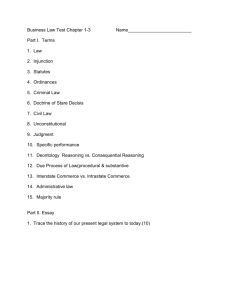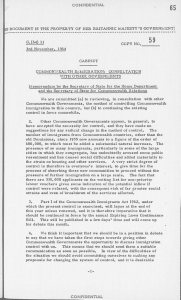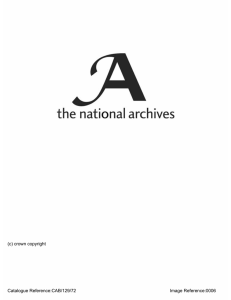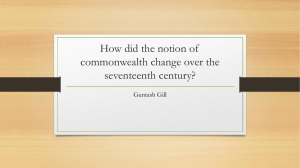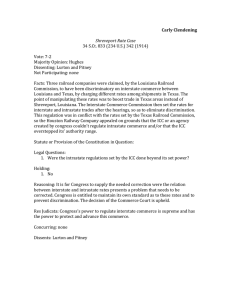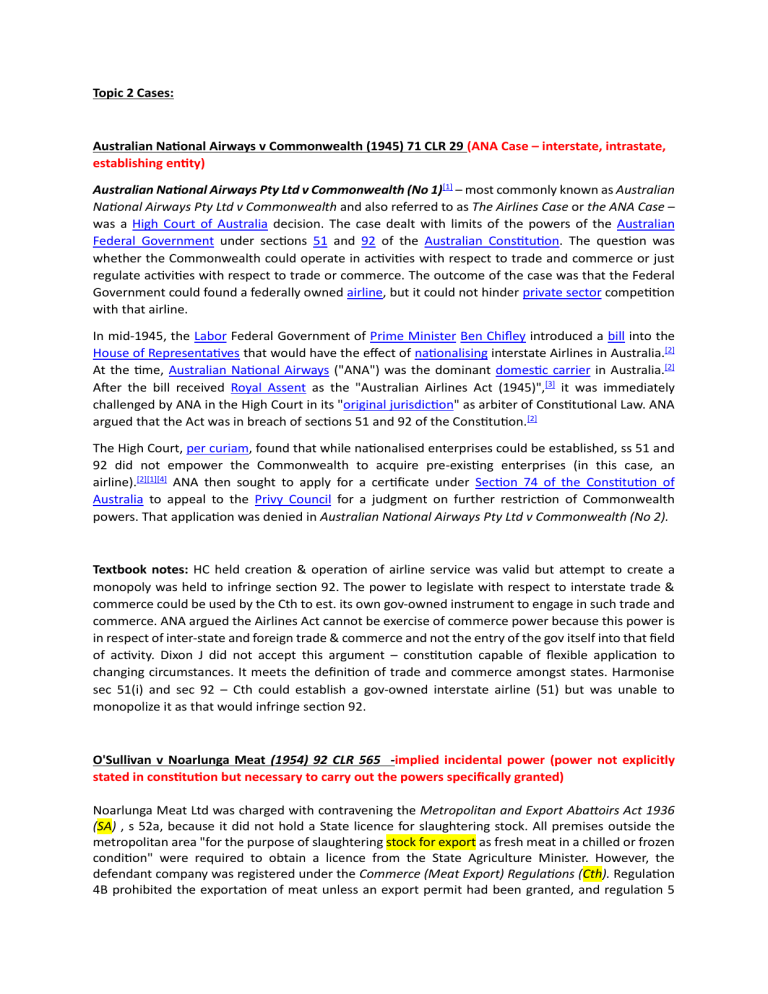
Topic 2 Cases: Australian National Airways v Commonwealth (1945) 71 CLR 29 (ANA Case – interstate, intrastate, establishing entity) Australian National Airways Pty Ltd v Commonwealth (No 1)[1] – most commonly known as Australian National Airways Pty Ltd v Commonwealth and also referred to as The Airlines Case or the ANA Case – was a High Court of Australia decision. The case dealt with limits of the powers of the Australian Federal Government under sections 51 and 92 of the Australian Constitution. The question was whether the Commonwealth could operate in activities with respect to trade and commerce or just regulate activities with respect to trade or commerce. The outcome of the case was that the Federal Government could found a federally owned airline, but it could not hinder private sector competition with that airline. In mid-1945, the Labor Federal Government of Prime Minister Ben Chifley introduced a bill into the House of Representatives that would have the effect of nationalising interstate Airlines in Australia.[2] At the time, Australian National Airways ("ANA") was the dominant domestic carrier in Australia.[2] After the bill received Royal Assent as the "Australian Airlines Act (1945)",[3] it was immediately challenged by ANA in the High Court in its "original jurisdiction" as arbiter of Constitutional Law. ANA argued that the Act was in breach of sections 51 and 92 of the Constitution.[2] The High Court, per curiam, found that while nationalised enterprises could be established, ss 51 and 92 did not empower the Commonwealth to acquire pre-existing enterprises (in this case, an airline).[2][1][4] ANA then sought to apply for a certificate under Section 74 of the Constitution of Australia to appeal to the Privy Council for a judgment on further restriction of Commonwealth powers. That application was denied in Australian National Airways Pty Ltd v Commonwealth (No 2). Textbook notes: HC held creation & operation of airline service was valid but attempt to create a monopoly was held to infringe section 92. The power to legislate with respect to interstate trade & commerce could be used by the Cth to est. its own gov-owned instrument to engage in such trade and commerce. ANA argued the Airlines Act cannot be exercise of commerce power because this power is in respect of inter-state and foreign trade & commerce and not the entry of the gov itself into that field of activity. Dixon J did not accept this argument – constitution capable of flexible application to changing circumstances. It meets the definition of trade and commerce amongst states. Harmonise sec 51(i) and sec 92 – Cth could establish a gov-owned interstate airline (51) but was unable to monopolize it as that would infringe section 92. O'Sullivan v Noarlunga Meat (1954) 92 CLR 565 -implied incidental power (power not explicitly stated in constitution but necessary to carry out the powers specifically granted) Noarlunga Meat Ltd was charged with contravening the Metropolitan and Export Abattoirs Act 1936 (SA) , s 52a, because it did not hold a State licence for slaughtering stock. All premises outside the metropolitan area "for the purpose of slaughtering stock for export as fresh meat in a chilled or frozen condition" were required to obtain a licence from the State Agriculture Minister. However, the defendant company was registered under the Commerce (Meat Export) Regulations (Cth). Regulation 4B prohibited the exportation of meat unless an export permit had been granted, and regulation 5 required that all premises used for the slaughter of meat to be registered. The defendant company argued that the State act was invalid by virtue of inconsistency with the Commonwealth regulations, which is dealt with in s 109 of the Constitution. The Commonwealth has the power to make laws with respect to "trade and commerce with other countries, and among the States", as per s 51(i) of the Constitution. This power authorises the prohibition of the export of certain commodities, and by extension the prohibition of commodities with certain restrictions. Regulation 4B is therefore within its power. Regulation 5 does not fall under the direct head of power. Instead, it falls within the implied incidental power, which was best expressed in D'Emden v Pedder (1904) 1 CLR 91 at p 110. Fullagar J, with whom Dixon CJ and Kitto J concurred, stated that the Commonwealth may control any steps leading to the export itself (generally labelled as "production") that may affect "beneficially or adversely" Australia's export trade. This includes provisions to control the quality of meat being exported, which may involve regulation of such stages as packaging and handling. In fact, it may be necessary to "enter the factory or the field or the mine" to secure Australia's export industry (i.e. go even further to regulate). In general regulation of production may occur where there is an objectively different method of production between meat destined for home and foreign consumption, but Fullagar J was clear in restricting the application of the principle to the specific factual circumstances at hand. Inconsistency: Fullagar J noted that it was possible to obey both sets of laws simultaneously, by acquiring both State and Commonwealth licenses. However, it was his opinion that the regulations expressed an intention to "completely and exhaustively" cover the field with regards to the regulation of such premises; he found the detailed regulations compelling in this regard. Furthermore, the State law would have acted to deny the rights granted by a certificate obtained under the Commonwealth regulations. The court was split 3-3. As this was a stated case and not an appeal, the decision of the Chief Justice prevailed,[2] in what is sometimes described as a statutory majority.[3] Airlines of New South Wales v New South Wales (No 2) (“Second Airlines Case”) (licencing, dualfederalism, not incidental, within ambit of s51 powers) Recent conflict between the Government of New South Wales and the controllers of the State's major airlines has resulted in a decision of the High Court of paramount importance in laying the boundaries of State and Federal power over civil aviation. Although technically a victory for NSW, Airlines of New South Wales Pty Limited v. New South Wales has established an area of Commonwealth control over air navigation hitherto unrecognized. Airlines of New South Wales Pty Ltd v New South Wales (No 2),[1] was a High Court of Australia case about the validity of Commonwealth regulations about intrastate air navigation. Although the Commonwealth has the power to regulate interstate air navigation under s 51(i) of the Constitution, it can only regulate intrastate air navigation under the implied incidental power attached to that head of power. It was held that intrastate air navigation can be regulated to the extent that it provides for the safety of, or prevention of physical interference with, interstate or foreign air navigation. In October 1964 the Air Navigation Regulations (Cth),[2] were amended to make them apply to intrastate air navigation by the enactment of regulation 6(1)(f).[3] Regulation 198 prohibited the use of an aircraft in regular public transport operations except pursuant to a licence issued by the DirectorGeneral of Civil Aviation, who, according to regulation 199(4), will have regard to the "safety, regularity and efficiency of air navigation and to no other matters".[3] Regulation 200B stated that "an airline licence authorizes the conduct of operations in accordance with the provisions of the licence".[3] The plaintiff, Airlines of New South Wales, had applied unsuccessfully for a licence to perform commercial air operations between Sydney and Dubbo, and then sought to challenge the validity and constitutional consistency of the Air Transport Act 1964 (NSW).[4] Regulations 198 and 199(4): The Court rejected the American doctrine of commingling that has found favour in the Supreme Court of the United States. Commonwealth legislative power cannot be enlarged to cover intrastate air navigation regardless of the integration of intrastate and interstate activities. However, Commonwealth laws can include intrastate activities within its ambit if for the Commonwealth law to be effective, it must operate indifferently to all activities, whether intrastate or interstate, in the relevant area. In particular, Kitto J stated that "the Australian union is one of dual federalism", and it is the Court's role to preserve such distinctions, however arbitrary; this distinction was also referred to by Dixon CJ in Wragg v State of New South Wales,[5] which was quoted by Barwick CJ in this case. Kitto J continued to state that to ascertain the true character of the law, we examine what it does "in the way of changing or creating or destroying duties or rights or powers".[6] Furthermore, Barwick CJ reiterated the rejection of the reserved State powers doctrine (see Amalgamated Society of Engineers v Adelaide Steamship Co Ltd[7]). In this instance, the enactment of State laws will not serve to curtail any Commonwealth power; the Commonwealth's power is to be construed from the text of the Constitution. Section 51(i) permits the Commonwealth to make laws, for interstate and foreign air operations, about safety, regularity and efficiency, as this would protect, foster and encourage interstate and foreign trade and commerce. Barwick CJ stated that this would then serve to extend to include intrastate air navigation, due to intrinsic factors related to flight, and the factual situation in this case. Similarly, the Commonwealth licensing regime, which Barwick CJ held to be a "substantial safety procedure", can apply to intrastate air operations or operators because of the impact of unsafe, inefficient or irregular air operations by intrastate airline operators. Kitto J stated that the law is within power if it protects against physical interference by having regard to safety, regularity and efficiency; this is in contrast to matters merely consequential to interstate or foreign air navigation, which would not suffice. Regulation 200B: Barwick CJ contrasted regulations 198 and 199(4) to regulation 200B. In the former, regulation of intrastate navigation was found to be in the Commonwealth's power to safeguard the safety of interstate and foreign air navigation. However, in the latter, the regulation purports to authorise the air operations themselves, as opposed to regulating the use of specified aircraft in those operations. The stimulation or authorisation of those operations that the regulation provides went beyond the regulation being a safety measure. Attorney-General (WA) (Ex rel Ansett Transport Industries (Operations) Pty Ltd) v Australian National Airlines Commission (“Ansett Transport Industries Case”) (commonwealth airline operating in state for profit, ultra vires i.t.o sec 51(1), party saved i.r.o territories s122) This case considered the trade and commerce power of the Commonwealth and whether or not the Commonwealth had the power to extend the operation of a Commonwealth owned airline to engage in intrastate travel, which is travel within a state, for economic reasons. Does section 51(i) incidentally include a grant power to legislate for intrastate trade and commerce when its only relationship to interstate trade and commerce lies in the fact that the purpose of engagement in such intrastate activity is to conduce the efficiency, competitiveness and profitability of the interstate activity. Australian National Airlines Act, new section 19B(1) which sought to operate the state owned airline within states (intrastate) inserted. Purpose for profit etc. It is apparent that the exercise of the power conferred by section 19B extends beyond incidental power and cannot be justified under section 51(i). Ultra vires. Could the valid operation of sect 19B be saved from the invalid operation by being read down under sect 15A of the Acts Interpretation Act to still apply to territories under sect 122. – yes. Murphyores Inc Pty Ltd v Commonwealth ( 1976) 136 CLR 1 (it is enough that the law operates on the topic of trade and commerce with other countries. A law which absolutely or conditionally prohibits exportation of goods is a law that operates on that topic) Murphyores Inc Pty Ltd v Commonwealth,[1] was a case decided in the High Court of Australia regarding the scope of the trade and commerce power in section 51(i) of the Constitution. Section 112 of the Customs Act 1901,[2] prohibited the exportation of mineral sands unless authorised by the Minister. Murphyores Inc Pty Ltd, which held leases from the state of Queensland to mine mineral sands on Fraser Island, sought permission from the Minister to export mineral sands. Such authorisation was withheld pending the outcome of an environmental inquiry. Murphyores challenged the constitutional validity of prohibition and sought an injunction to the study, and a declaration that the Minister cannot make a prohibition for environmental purposes. In a unanimous decision, the court held the legislation was a valid exercise of the trade and commerce power. Section 51(i) was a non-purposive power, and the only relevant factor was the subject matter of trade and commerce. The motive and purpose behind the legislation was irrelevant. The power conferred by s. 51 (i.) enables the Parliament to prohibit, regulate and control the importation and exportation of goods, matters which lie at the heart of trade and commerce with other countries. The power to legislate with respect to trade and commerce with other countries, including as it does power to prohibit and regulate the exportation of goods from Australia, necessarily comprehends the power to select and identify the persons who engage in, and the goods which may become the subject of, that activity Redfern v Dunlop Rubber Australia Ltd (“Redfern's Case”) 1964 110 CLR 194 This case considered the trade and commerce power under s.51(i) and whether or not the Commonwealth could regulate the activities of a tyre manufacturer where sales were transacted both interstate and intrastate. The central issue was whether these sales could be separated and whether the trade and commerce power could also regulate the intrastate sales as well. The plaintiffs, Highway Tyre Service, Pakenham Tyre Service, and H.J. King Tyre Service ("Redfern") were three companies engaged in carrying on the business of buying, selling and dealing in motor and cycle tyres and tubes. The defendants consisted of five companies: Dunlop Rubber Australia Limited, B.F. Goodrich Australia Pty. Limited, The Olympic Tyre & Rubber Co. Proprietary Limited, Hardie Rubber Company Pty. Limited, and The Goodyear Tyre & Rubber Co. (Australia) Limited. These companies were all incorporated in the state of Victoria. The companies entered into a series of contracts between them, which contained terms to the effect of fixing the prices of goods for traders, and the terms on which the goods could be retailed. It was alleged that all of this was done in restraint of, or with intent to restrain, trade and commerce among the States. The plaintiffs claimed that damage resulted from the contracts, arising in their inability to obtain tyres and other goods at wholesale prices and the ability to obtain them only at the prices established under the contracts. The case involved the Australian Industries Preservation Act, which made it an offence to enter into a contract covering a restraint of trade. The action was commenced in the original jurisdiction of the High Court. The defendants objected to the sufficiency of the claims and the case was referred to the Full Court. The issue present was whether the Commonwealth Act could regulate contracts concerning trade and commerce of companies within a single state. The High Court held that the Commonwealth could render the contract void, even if it contained terms that cover purely intrastate trade. This involved a practical consideration where a party could void the involvement of the Commonwealth in regulating trade and commerce by simply inserting an intrastate clause in a contract. Menzies J stressed the importance of the principle that the Commonwealth's power over trade and commerce extends only to intrastate trade and commerce that is inseparably connected with interstate trade and commerce. Menzies J further noted that this principle was quite consistent with allowing the Commonwealth the power to prohibit or regulate acts that relate to intrastate trade and commerce if they relate to interstate trade and commerce or overseas trade and commerce as well The High Court hence unanimously adopted Owen J's dissent in Swift Australian Co (Pty) Ltd v Boyd Parkinson,[2] by holding that the Commonwealth was within power to produce legislation covering mixed activities. Huddart Parker v Commonwealth (1931) 44 CLR 492 This case considered the trade and commerce power of the Commonwealth and whether or not it could be used to give preference to union members on shipping ports and affect a matter that was not directly related to trade and commerce. The Commonwealth Transport Workers' Act provided that the Governor-General could make regulations with respect to the employment of transport workers, and the licensing of persons engaged. as transport workers, and that such regulations, when made, should override other Federal Acts of Parliament. It was contended that the power conferred on the Governor-General to make regulations was in conflict with the constitutional separation of the Legislative from the Executive power of the Commonwealth . R v Foster: ex parte Eastern and Australian Steamship Co (1959) 103 CLR 256 Wragg v New South Wales (1953) 88 CLR 353 This case considered the trade and commerce power of the Commonwealth and whether or not the Commonwealth had the power to regulate prices for potatoes grown in Tasmania and sold to NSW. It explores the trade and commerce power of s.51(i) and s.92 of the Constitution Key Q – whether the incidental power is restricted in the context of sec 51 by the court’s acute sensitivity to the Cth encroachment into the domain of purely intrastate trade. Distinction between intrastate and interstate must remain.
